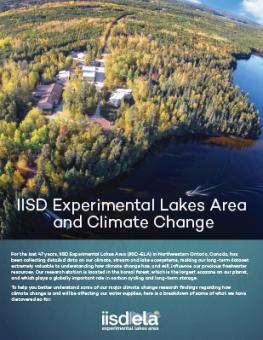
IISD Experimental Lakes Area and Climate Change brochure
IISD Experimental Lakes Area brings a 47 year (1969–present) history of monitoring climate, water quality and fisheries in a unique whole-ecosystem laboratory setting.
IISD Experimental Lakes Area (IISD-ELA) brings a 47 year (1969–present) history of monitoring climate, water quality and fisheries in a unique whole-ecosystem laboratory setting.
Now, as a part of IISD, it has the opportunity to use its long-term monitoring dataset to examine how climate change is affecting boreal forests, wetlands and lakes from a consistent, long-term, whole-ecosystem dataset of significant scientific and societal value.
This brochure presents some of IISD-ELA's major climate change research findings, so you can see the data for yourself and understand how climate change is affecting our lakes.
You might also be interested in
IISD Annual Report 2023–2024
While IISD's reputation as a convenor, a trusted thought leader, and a go-to source on key issues within the sustainable development field is stronger than ever, the work happening outside the spotlight is just as valuable.
For Nature-Based Solutions to Be Effective, We Need to Work with Indigenous Peoples and Local Communities
Nature-based solutions have been praised as a promising approach to tackling the twin crises of climate change and biodiversity loss. But some Indigenous Peoples and local communities are questioning the legitimacy of the concept and what it symbolizes. It is time to listen to what they have to say.
How Can We Work With Nature to Tackle Drought and Desertification?
Drought is one of the most devastating and pervasive challenges exacerbated by climate change. However, we can work to reduce its effects through nature-based solutions for land restoration and climate-smart agriculture.
Why Liquefied Natural Gas Expansion in Canada Is Not Worth the Risk
An analysis of the economic and environmental risks of liquified natural gas expansion in Canada.